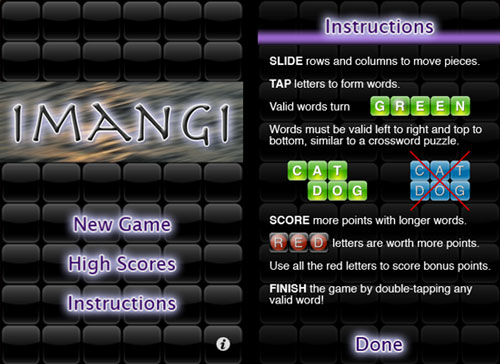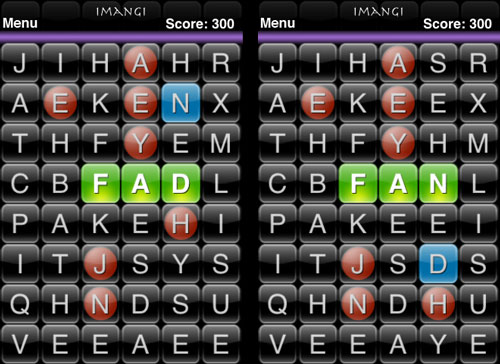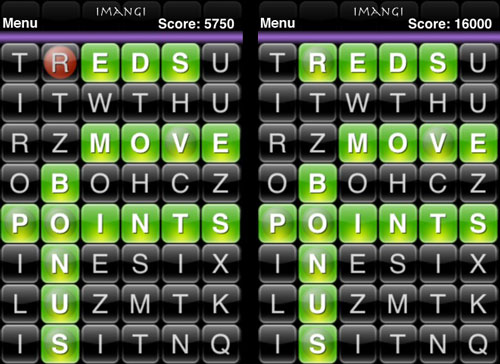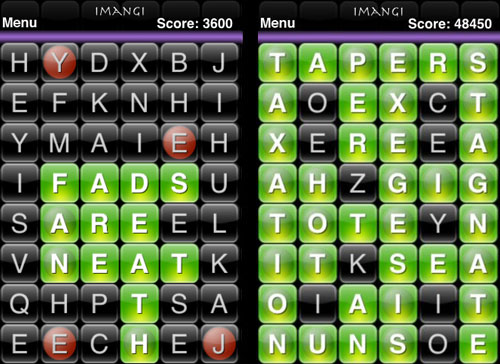
Imangi
Some will compare the game play of Imangi to generic crossword or word search puzzles, or maybe games like Scrabble or Boggle. For me, it is the millennial version of the classic sliding puzzle toy my parents would give me as a child for long car rides because Ritalin hadn't been invented yet. The 15 Puzzle, as it was originally called, possessed a power to draw one into its square frame, sliding numbered tiles into order or reconstructing a jumbled picture from 14 image tiles. In Imangi, the tiles are letters formed into words, but the game's draw is more complex. This is not to say Imangi is difficult to play—it's easy. The hard part is quitting.

Cause and effect in word play
There are 48 letters on a 6x8 rectangular grid. Tap a tile and it turns blue. Tap letters that form a word and the tiles turn green. Move a tile—here is the thing—and the entire column or row moves, meaning previously created words can come undone with the swipe of a finger. Speaking of swiping, the multitouch interface of the iPhone works great for Imangi. The tiles are sized for even the fattest of sausage fingers, and the animation is fluid. There are also annoying—to me—sound effects that can be silenced by using the iPhone's mute switch. As for the word list the game is based upon, it's pretty forgiving. I have yet to see a word rejected.

Game imbalance is a red letter word away
Scoring is done by adding points for each letter in a word, plus a multiplier bonus depending on the length of the word. A normal letter is worth 100 points, a red letter worth 250 points, and here is my first (minor) complaint about Imangi. There are four levels of difficulty defined by the number of red letters: 7, 14, 21, 28. Using all red letters earns a bonus of 10,000 points, regardless of difficulty setting. Scaling the bonus, perhaps a geometric progression starting with 1,000 points, might provide for more balanced play. Another complaint—again minor—concerns game length. In Imangi, you quit whenever you feel like it. For people like myself who make commitments to games like long-term relationships, that's fine, but the casual gamer might like a little closure. A timed mode would be a nice addition to game play.

High-scoring game by Ruth in California
As for how to play, as in strategy, Keith Shepherd of Imangi Studios lays out the basics.
My personal strategy is to try to use all of the red pieces before I quit. That ensures that I get the 10,000 point bonus. I typically start a game by trying to make at least one 8-letter word going down the left side, using as many red pieces as possible. Then I try to make a 6-letter word across the top. Those words can now be used as bases for other words.
In terms of moving letters around, it is key to learn how to use spaces as pivots. It is often necessary to mess up one word while trying to form another, which is fine as long as you can put the original word back together.
I cluster words in the center of the screen, using the edges as "safe" rows and columns for the rapid movement of letters until a combination catches my eye. Later, it becomes a stretch of my verbal and spatial skills to hold within my mind all the moves that turn words from green to blue to green again. Finally, I can do no more and end the game and count my score.
Currently, you can submit high scores via e-mail with a screenshot, but Imangi Studios is working on an "online social component to the game where you can play the board of the day and submit your scores to compare yourself to others around the world." I'd like to see a high score list accessed from within the game too, so I could feel either superior—more likely inferior—to others.
If I seem critical of Imangi, it is strictly constructive, and any changes to the game would only add to the experience. As the Wii has demonstrated beyond doubt, the play is always the thing in any game. As word puzzles go, Imangi definitely has game.
Game: Imangi for iPhone (App Store Link)
Publisher: Imangi Studios
Price: $3.99
reader comments